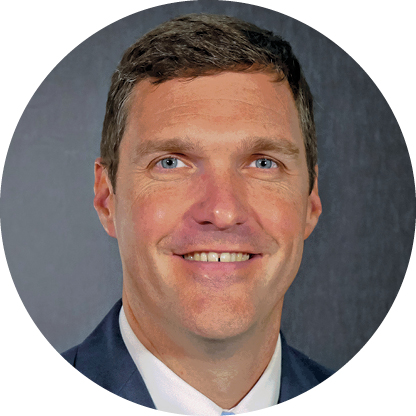As executive director of Accelerate Mississippi, Ryan Miller has a front-row seat to the workforce shortage crisis in the Deep South. Just a little over a year into the job, he’s seen the highs and lows faced by workers and employers alike, and today he says he feels like Mississippi is closer than ever to getting it right.
“It is no smaller a task today than it was a year ago,” says Miller. “Some significant things have taken place to advance Accelerate Mississippi’s position to elevate our workforce.”
 “We did not have an infrastructure in place a year ago to deliver all programs fully. We have since developed our ecosystem approach.”
“We did not have an infrastructure in place a year ago to deliver all programs fully. We have since developed our ecosystem approach.”
— Ryan Miller, Executive Director, Accelerate Mississippi
In a recent interview, Miller outlined the efforts of Accelerate Mississippi and shed light on how the Magnolia State is becoming an innovating force in connecting people to jobs and vice versa.
What have been some of your biggest accomplishments over the past year?
MILLER: The first is our team — our human capital in bringing great experience to the table. Since I started here just over a year ago, I have brought in multiple professionals from economic development, a former vice president of a local community college, and the former chief academic officer of Mississippi. We are bringing more team members on in the coming days. Our office is growing to include all of those areas that are most important to site selectors. Secondly, because of the people we have brought in, we have been able to get ourselves organized as a state. We did not have an infrastructure in place a year ago to deliver all programs fully. We have since developed our ecosystem approach. We now have established eight different geographic ecosystems across the state. There are unique challenges facing different areas of the state. We can develop strategies with those unique areas in mind. We put together a series of local ecosystem tables. These are the people who will work with us on the ground in those ecosystems. They all have a direct impact on workforce. We need to have our local economic developers at the table. We also have wonderful non-profit participation. We have great buy-in from our local governments too.
You recently went through your first legislative session in Mississippi. Did workforce achieve any big wins this time?
MILLER: This was my first legislative session. That is a unique process. It was a three month experience that helped me learn how to effect change through state law. Workforce was a significant issue — maybe the top issue facing the state. Both the governor and lieutenant governor threw their support behind what we supported. Our key bill involved plans to roll out a career coach model throughout Mississippi. This centers around the ability to help students plan and pursue a professional path. A career coach model was rolled out in Northeast Mississippi a few years ago. We noticed that in the schools there, the students were getting the one-on-one attention they needed to focus on a career and make plans for it. Career coaches help young people develop a road map for that. We helped push HB 1388 across the finish line. It allows for a much more robust rollout of career coaches across all eight regions of the state. We are trying to show students that there really is no such thing as Plan B. Everyone assumes that you are going to college. We have to get students away from having a “fallback plan.” There is no Plan B. Getting a technical certificate right out of high school is Plan A. Another part is the Career Technical Education ROI Study. We are making sure that our CTE programs align from K-12 through community college. Our hope is that this will actually grow our pipeline. The ultimate desire is to see programs align through the educational system of Mississippi.
And there is one more thing — ARPA funding. We were given the responsibility of over $40 million toward growing workforce sectors that have a direct connection to the COVID-19 pandemic. It was HB 1517 that gave us significant funding to help us grow our healthcare workforce through the entire life cycle of the industry.
We are also working to get more people in the supply chain and pursue logistics careers. The Legislature trusts what we are doing. We want to get more Mississippians in higher trajectory careers.
What can be done to increase the supply of technically educated workers?
MILLER: The pandemic was a disruption. You are seeing real innovation in how we do things. The educational system is responding in a substantial way. You will see more value placed on technical degrees. The way that people digest education is changing. People on the front lines see that. We see it more as a highway with a lot of on and off ramps. There are some companies here that have seen this trend going on for many years. For example, we need to get more young people behind the wheels of trucks. We have awarded over $14 million in funds to local community colleges to grow our capacity and double it in those programs.
What did you learn from the recent Talent Development Assessment study you conducted?
MILLER: I wanted to bring a sense of community improvement to this job. You have to take a snapshot of the current condition. This report is it. How healthy are we as a state? If things are bad, we need to assess it and admit it. That is going to be a recurring report every year. We also have our Mississippi Road Ahead document. It breaks down each ecosystem in terms of how healthy it is. It gives you a timeline on where we go from here. I think the connectivity of it was eye-opening. That is how we identified that diesel tech was one of the needs. There are a lot of common denominators in why people are not pursuing these paths. And there are some good things that we saw across the state. The Career Coach Model in Northeast Mississippi was a wake-up call to me. We are seeing many positive things in these communities. How can we replicate that around the state?
What are your top priorities for year two?
MILLER: This is where we are going to have our deployment. We cannot develop strategy and deploy it successfully if we do not have boots on the ground in local communities. We are going to bring on board our ecosystem teammates. We will gear up for our funding through ARPA and develop our Career Coach Model.

